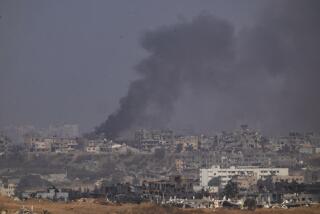French Seek Kadafi Kin in Bombing : Terrorism: Warrants are issued in Paris for four Libyans in the destruction of a jetliner. The case may be related to the Pan Am explosion over Lockerbie.
- Share via
PARIS — A French investigative magistrate issued arrest warrants Wednesday for the brother-in-law of Libyan leader Moammar Kadafi and three other Libyan officials in connection with a 1989 French airline bombing that some investigators say could be related to the earlier Pan Am Flight 103 blast over Lockerbie, Scotland.
Leading the names in the international arrest warrants issued by French Judge Jean-Louis Brugiere was Kadafi’s brother-in-law, Abdallah Senoussi, considered by U.S. authorities as the No. 2 man in Libyan intelligence.
Brugiere, the French magistrate in charge of most major terrorist investigations, also alerted Interpol countries to detain for questioning two other senior Libyan officials, Deputy Foreign Minister Moussa Koussa and No. 3 intelligence official Abessalam Zadma.
In a telephone interview, Brugiere said he hopes for arrests soon in the case of the September, 1989, bombing of the French UTA airliner over an African desert, killing 171 passengers and crew.
The judge refused to discuss possible Libyan connections to the earlier Pan Am bombing over Lockerbie in December, 1988. But American authorities say evidence suggests that both bombings may have been planned by the same group of Libyan officials.
“I can’t comment on the American case,” Brugiere said. “You have to ask the Americans. All I can tell you is that these are the results of a purely French investigation involving only France.”
But according to a French television network report, several of the men named in the French case met in Tripoli in September, 1988, to discuss bombings of American and French jets. The report on the TF1 network said Brugiere had “written evidence” that Senoussi was involved in the UTA bombing.
The timing device used in the Pan Am explosion, which killed 259 people aboard the aircraft and 11 people on the ground, is believed to have a “signature” similar to those used in previous Libyan-backed terrorist schemes. It was manufactured, U.S. investigators believe, by the same Swiss company that made triggering devices recovered from Libyan agents arrested in Dakar, Senegal, in February, 1988, during an airport search.
After first suspecting the Syrian-based Popular Front for the Liberation of Palestine-General Command in the Pan Am case, Western authorities have shifted the blame to Libya, based on Libyan connections uncovered in separate French and U.S. Justice Department investigations.
French authorities believe that the bombing of UTA Flight 772, a flight to Paris that originated in Brazzaville, Congo, and blew up over the Niger desert after a stop in N’Djamena, Chad, was in retaliation for the French defeat of Libyan forces in northern Chad in 1987.
U.S. investigators, meanwhile, contend that the primary motive behind the Libyan bombing of the Pan Am flight was revenge for the 1986 bombing raid on Libya, in which about 40 people, including Kadafi’s adopted daughter, died.
According to an informant to the French government in the UTA case, terrorist bombing attacks against both French and American airliners were discussed in a September, 1988, meeting in the Libyan capital Tripoli. It was attended by Senoussi, Koussa and other officials.
Named with Senoussi in the international arrest warrants charging participation in a “terrorist enterprise” were Abdallah Elazragh, an envoy at the Libyan Embassy in Brazzaville at the time of the UTA attack; Ibrahim Naeli, a Libyan secret agent who is believed to have recruited the man who carried the bomb on the aircraft, and Musbah Arbas, an assistant to Naeli.
In a meeting of family members of UTA crash victims last month in Paris, Brugiere told them that evidence showed that Libya was behind the attack. The Libyan government immediately disputed the judge’s claim. Agence France-Presse, a French news service, reported Wednesday that Kadafi sent Senoussi, his brother-in-law and the same man named in Wednesday’s arrest warrant, to Paris as a diplomatic envoy with the message that Libya would not “take the blame” in the case.
The warrants were issued only four days after Foreign Minister Roland Dumas was among those arguing that European Community sanctions against Libya, in effect since 1986, should be lifted. Dumas’ proposal was supported by Italy, Portugal and Spain.
Francoise Rudetzki, president of SOS Attentats, a group representing victims of terrorism, urged the government Wednesday to “demand that the criminals be brought to justice in the UTA case or we, the victims, will call for economic and political sanctions against Libya.”
More to Read
Sign up for Essential California
The most important California stories and recommendations in your inbox every morning.
You may occasionally receive promotional content from the Los Angeles Times.












